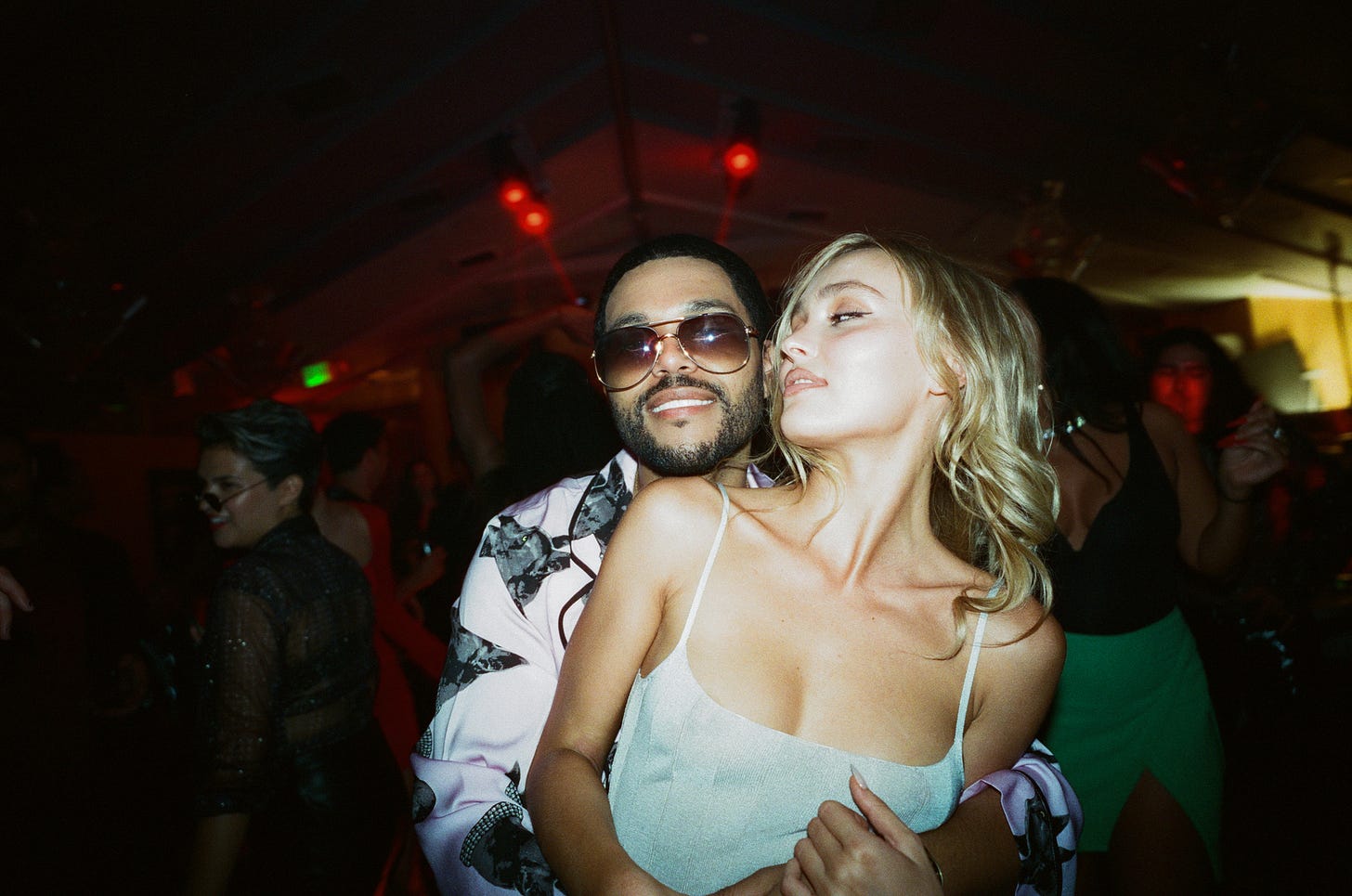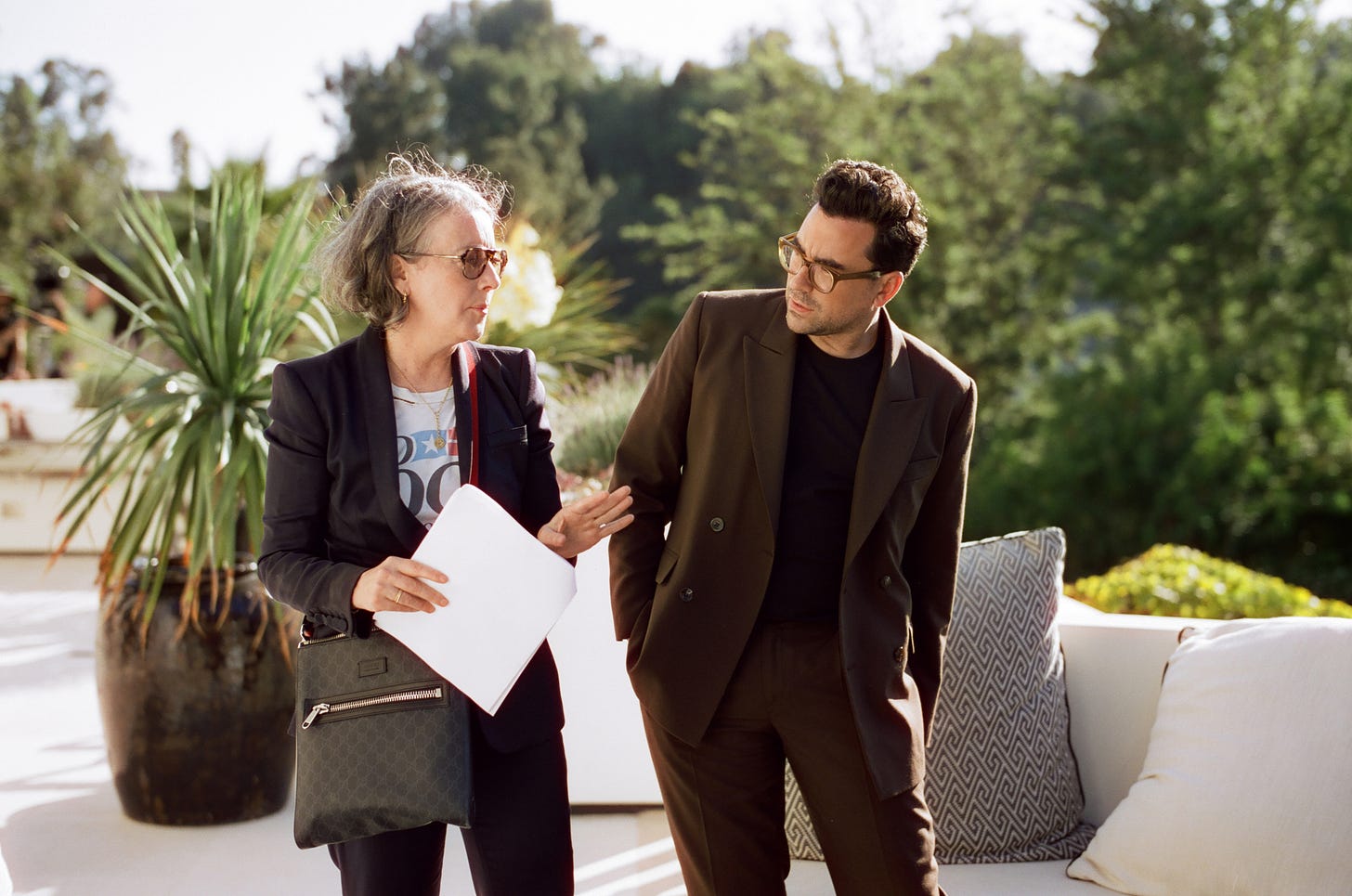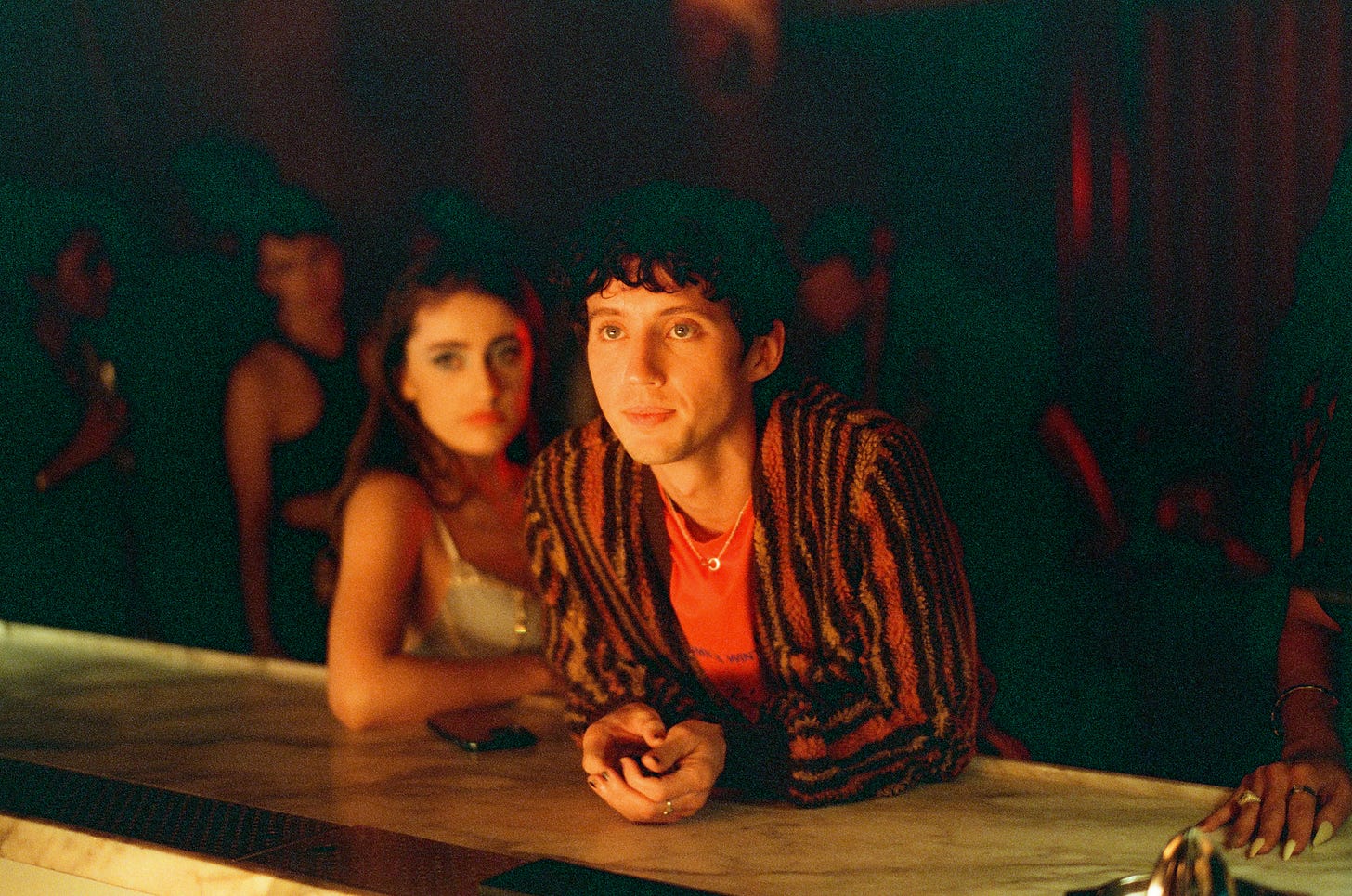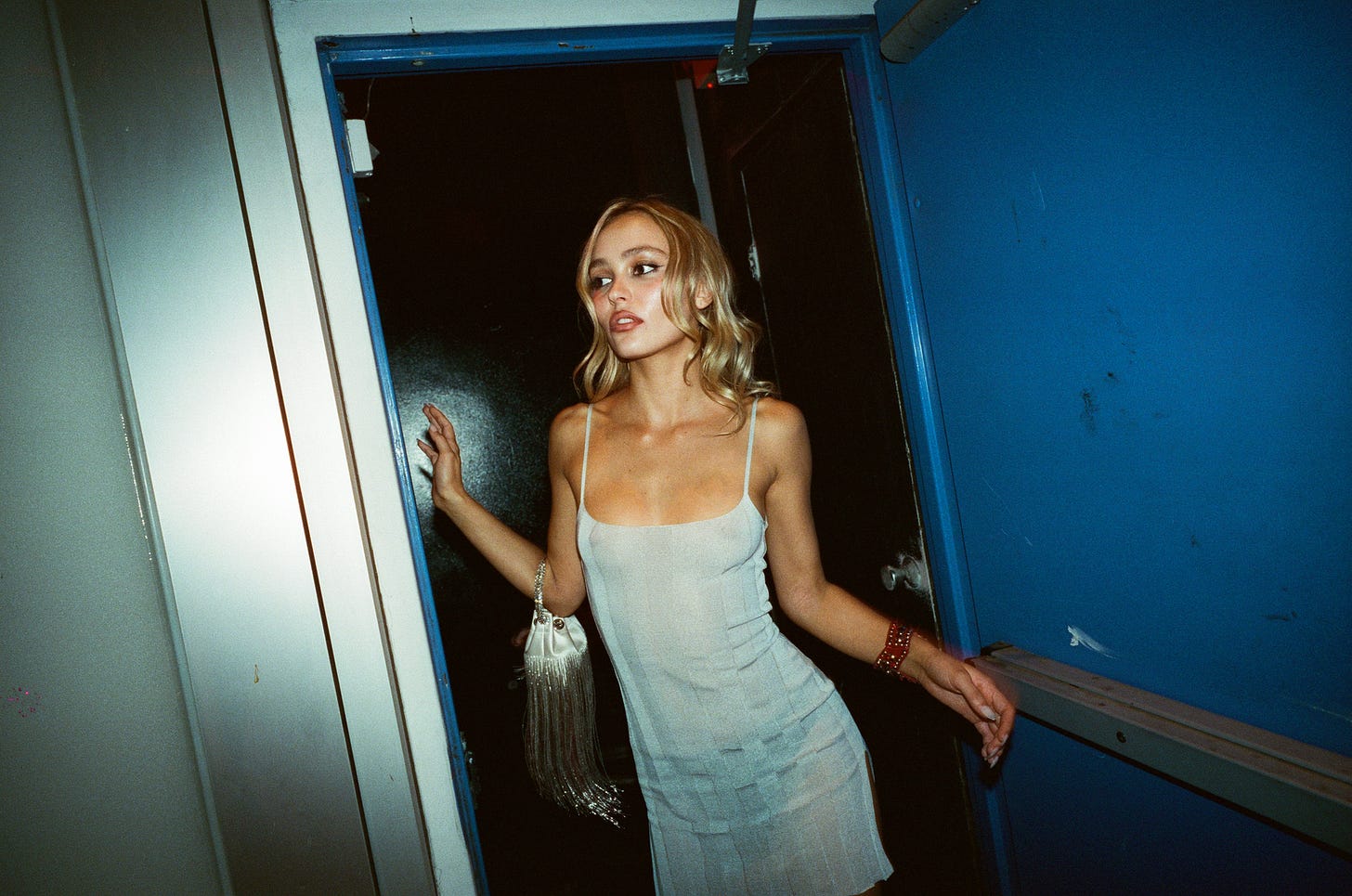Review: The Idol, "Pop Tarts & Rat Tales" | Season 1, Episode 1
A dialogue on whether HBO and A24's buzzy drama is worth watching (and whether it deserves our critical attention)
Welcome to Episodic Medium’s coverage of The Idol, HBO and A24’s drama that kicks off our summer coverage schedule. It’s also a show that has courted controversy before its debut, and which I had some ambivalence about covering at all, so to start things off I decided to have a dialogue with contributor Ben Rosenstock, who’ll be on the beat weekly. To read his future coverage and help support all of our contributors, become a paid subscriber.
Myles McNutt: Ben, when I was setting the summer schedule, I spent a long time staring at The Idol and considering whether it was actually something we wanted to cover. This was before the fairly disastrous Cannes premiere, critically speaking, but the Rolling Stone expose of the behind-the-scenes tension had already basically confirmed that this was going to end up a bit of a boondoggle for HBO and A24. And when it comes to high-priced, high-profile boondoggles, there’s a clear market for pre-air coverage that lets audiences situate themselves, but covering it weekly feels like something of an endorsement, particularly for a site like ours that isn’t hunting for clicks or page views in the same way as an ad-supported environment.
And in truth, I landed on covering it mainly because we were lighter on things to cover in early June, but I also thought it was an opportunity to explore the boundaries of what we’re building here at Episodic Medium. Is this a community that wants to get together to struggle with a vanity project of enabled egomaniacs? Or simply to read as one of us struggle with something that provokes and exploits with little to say otherwise? Or does it send a bad message that we’ll just reflexively cover every HBO Sunday drama, even if it’s odious?
And so before we get into The Idol itself, Ben, I’m curious: as our token youth (complimentary) who grew up reading this type of criticism, do you think coverage constitutes endorsement? And how do you approach writing about a show that was divisive before people even saw it?
Ben Rosenstock: To some extent, amplifying a show’s existence is always going to encourage viewership, no matter how negative the coverage might be. In fact, when I think back to my days reading A.V. Club reviews in high school, in some cases a D- or F review intrigued me more than a tepid C+ review. Of course, that’s a discussion of quality, whereas we’re talking about the issue of behind-the-scenes exploitation; there’s nothing unethical about watching a bad show, but the issue is murkier when we’re discussing a disastrous production.
But troubled productions can still illuminate a lot about both the people behind them and the cultural context in which they’re produced. While I understand the argument that we shouldn’t be supporting a show like this one by writing about it, I can’t help feeling curious about how its tortured backstory manifests on-screen, if at all. How will last year’s massive, expensive creative overhaul impact the show’s quality? How will the centered perspectives of male artists like Abel “The Weeknd” Tesfaye and Sam Levinson impact its depiction of sexual exploitation and predation in the music industry? And how will the themes of that brutal Rolling Stone expose bleed into the actual themes of the series?
When I was first really getting into TV, I tended to seek out the best-reviewed shows that were on, for obvious reasons. But as I’ve transitioned to writing about TV as a career, I’ve found myself interested in all sorts of shows for all sorts of reasons, regardless of quality. A huge part of any form of criticism is curiosity, and it can be just as interesting to unpack a failure as it is a success. When it comes to The Idol, for me, that curiosity still remains.
But then again, maybe I’m once again conflating “bad show” with “abusive production.” Where do you draw a line in covering something like The Idol, Myles, and what potential benefits do you think writing about the show can offer?
MM: I said before that covering The Idol tests the boundaries of Episodic Medium’s approach to television criticism, but my interest in it is largely based on how it similarly tests limits of this model of television production. You have the A24 brand, you have Abel and Sam as dueling auteur figures, you have HBO’s 9 months of watercooler dominance dating back to House of the Dragon—the show wants to be seen as edgy and groundbreaking, but its actual content is far less interesting than the idea of how much these auspices can sustain a show so detested (and, having now seen the premiere, detestable). And ultimately, those subjects—the celebrity turned auteur, the auteur turned celebrity, A24 and HBO banking on both—are a real and functioning part of the media landscape that this show will be speaking to throughout its brief six-episode run in ways that I’m fundamentally interested in.
And to speak to the premiere directly, they’re also subjects that loom incredibly large as this story unfolds. The first half of “Pop Tarts & Rat Tales” is the show sketching out the contours of its purportedly exposing view of the contemporary music industry: Jocelyn is coming out of a mental breakdown following her mother’s death, and everyone around her is desperate for her to make a comeback. The episode is purposefully obtuse about what most members of her team actually do—Hank Azaria seems to be her agent or manager, and Dan Levy registers as her publicist, but I still don’t know what Da’Vine Joy Randolph’s role would be, nor does the episode seem that concerned with the specifics of Jane Adams’ part in this. What matters is the idea that there is a team deciding her every move and orchestrating the album cover shoot and single release that will return her to the spotlight, and working to cover up the explicit image circulating online.
And while I didn’t think there was much in the way of original observations in this portrayal, and having Eli Roth’s Live Nation exec talk about “40,000-seat arenas” destroys any claims to verisimilitude1, Lily-Rose Depp is a compelling presence, and she’s surrounded by some interesting performers (including Troye Sivan as her “creative” lead and Rachel Sennott as her friend/assistant). But then the literal second that Abel Tesfaye appears in his rat tail, it becomes his show, and whatever it was saying about pop music is absolutely and utterly swallowed by the sheer vanity of this character and the projected vanity of his portrayer. The psychosexual nonsense that follows is ostensibly wrapped up in a critique of pop music’s commercialism, but in context it just plays out as a reminder that this is never going to be a show about Jocelyn, because it’s always going to be a show about The Weeknd and Sam Levinson making this a show about themselves.
And that tension is compelling to me, in ways that could be instructive about these types of vanity projects in the future, but did you feel in watching it that there’s six episodes of things to say about the particular contours of this mess? (Or, heck, maybe you didn’t find it as messy as I did!)
BR: I’m also not very optimistic about where the show is going, but I do think this first episode worked at least a little better for me than for you—perhaps just because my expectations were so low. Sure, there’s every reason to think the show will become about The Weeknd and sideline our ostensible protagonist, especially based on what we’ve read. But for at least this first episode, I did feel like Jocelyn was front and center, and the outlines of her potential character arc are clear. Even if Tedros ends up swallowing the narrative whole, here he mainly exists to gesture toward what Joss wants: an escape from her ultra-controlled life, and a perspective outside the team of people-pleasers in her employ.
That said, I agree that “Pop Tarts & Rat Tales” does lose a lot of its momentum when it strays from the industry stuff. For all that the marketing of The Idol has played up its edginess, and for all the behind-the-scenes drama inadvertently contributes to that vibe, so far the psychosexual nonsense is pretty unremarkable. This, especially, is where I’d imagine this show could get dull after a while, especially because we know so little about Tedros outside of his generally sinister, “rape-y” vibe. Tesfaye isn’t totally devoid of watchability—I thought that moment with him rehearsing his seductive greetings in the mirror was effectively unsettling—but I’m also still not sure I want to spend six episodes with him, especially if he’s positioned as some unlikely romantic hero meant to “fix” Jocelyn’s supposed sexlessness.
The first half of the episode works better, even if some of the dialogue—particularly anything related to the intimacy coordinator subplot—made me roll my eyes. As you mentioned, most of the people on Jocelyn’s team seem interchangeable in terms of professional duties, but I like the idea of this council of adults making her decisions for her. They shower her with affirmations to keep her calm, but most don’t actually care much about the human being whose schedule they dictate. And Lily-Rose Depp is working for me so far, her expressions and body language suggesting a fatigue and discomfort with this life—despite the beauty, talent, and natural malleability that makes her well-suited for it. At times she’s an intentional blank slate, which makes sense given the show’s interest in the emptiness and artifice of celebrity.
It’s a subject matter that would-be director Amy Seimetz really could’ve nailed, if that pre-Levinson version of this series was the one we got. The Idol isn’t entirely dissimilar from The Girlfriend Experience, which focused on a young escort who discovers a surprising aptitude for embodying the sometimes-unconventional desires of her clients. But the tone is far less consistent here, switching somewhat erratically from atmospheric horror vibes to madcap industry satire, and the looming mystery of what’s going on with Tedros and his cronies already threatens to distract from the character story I’m actually interested in following. Seimetz might’ve brought a lighter touch to the writing, remembering who this story should be about.
Maybe more than anything else in the reporting on The Idol, I keep thinking about Tesfaye’s unhappiness that Seimetz’s version was “leaning too much into a female perspective.” Still, putting all that out of my mind, I feel like certain parts of this episode aren’t drastically different from what Seimetz might’ve envisioned—maybe not on a line-by-line basis, but conceptually. Do you see glimpses of a potentially interesting character-driven story here, or is Tesfaye already a show-killer? And is your experience of the mythology around Tedros irrevocably affected by seeing Tesfaye’s name five times in the credits?
MM: Your point about tonal inconsistency is definitely front of mind for me, when thinking about the Weeknd of it all. The choice to lean into the horror vibe means that I was encouraged to perceive him as a threat or a danger, but narratively he is as you note an escape, and someone who believes in the power of pop music. And I really couldn’t shake the line where Leia refers to Tedros as “rape-y” and Joss insists that she likes that about him, which just sounds like something born out of this “male-centered” view of her character and her story. And while the tone gives us space to read this as horror, the inconsistencies make me paranoid that she’s going to discover how to unlock her true self by embracing the horror, or some other nonsense.
But you’re right that we can’t say for certain what the show does or does not want to say based on what we see here. In the end, I don’t think we leave the premiere with a definitive understanding of how the show bears the scars of its making, given that the actual story (as opposed to the themes) remains tightly under wraps. And as such, I’m intrigued to see how your perspective evolves week-to-week, and do think the premiere is substantive enough to push back against writing off the show in its entirety.
But I’m never going to be able to take Tedros seriously, based on my experience with this premiere. The rat tail probably doesn’t help, but there’s this idea that what we’re seeing is his vision of this story that I just can’t shake. The credits definitely didn’t help, especially given that Tesfaye is top-billed ahead of Depp despite the premiere (I agree) leaning on her perspective. I concur that given the low expectations this wasn’t as much of a complete disaster as the early press suggested it could be, but there’s little evidence available to suggest that it will resist its worst impulses, which makes it harder for “slightly exceeded low expectations” to generate the hope it might have without all the additional context we have on the project.
But that’s why it’s good you’re covering it and not me. And so I turn the Strays over to you, and we’ll see how much your review of next week’s episode convinces me there’s a good reason to keep going.
Stray Observations
Going forward, one thing I’m looking for is some clarity around Jocelyn’s perceived sexlessness. Is this an image problem she’s been dealing with, one that’s preventing her from reaching the stratospheric heights she could be? That idea doesn’t totally square with what we see of her throughout the episode; her sexual relationship with Tedros is meant to liberate her from some outwardly puritan version of herself, but Jocelyn is never really framed as innocent or virginal. (Perhaps if she was, this would feel even more like Black Swan.)
Relatedly, the leaked photo does feel a little tame to me, especially given the team’s plans for her rebrand. For a much more effective and immersive depiction of how world-shattering a leaked nude might feel, check out the first episode (as well as the rest) of I Hate Suzie.
Going back to Jocelyn’s desire to feel threatened, it seems notable to me that she is actually the first one to complain about the intimacy coordinator, even if it becomes everyone else’s problem. There’s already something slightly reactionary about the show’s centering a female character who wants to be sexualized, gosh darn it, but can’t with all these well-meaning male feminists coddling and condescending to her. When the coordinator says “It’s the price of safety,” it feels like the show is mocking him even though he’s right.2
Similarly to Euphoria, Levinson’s writing is most effective when it’s pared down and realistic: “You should be having way more fun.” “I’m trying.”
Not much to say about Jocelyn’s backup dancer Dyanne yet, but I know there’s quite a bit of anticipation from the Blackpink fandom for Jennie’s acting debut.
Beyond the fact we have no evidence to suggest that an artist on this scale would ever tour at that level, the U.S. does not have 40,000-seat “arenas.”
Would love to know how the cast of Euphoria felt watching Levinson dismiss intimacy coordinators this way.









Yeah I'm skipping this show. The Weeknd being credited over Lily Depp speaks volumes. But I WILL be tuning in for hate-recapping.
The sense of the series moving forward that I get from the pilot is "STAR 80 but way dumber". Levinson seems like someone who has good taste (probably loves De Palma, trashy erotic thrillers, obviously the BASIC INSTINCT cameo was incredibly on the nose) but doesn't know how to actually create a sense of genuine eroticism or danger on screen, and it's awkward to see him try, especially with Depp's and Tesfaye's... less than ideal acting.
The trajectory of Tedros's character seems obvious (especially with the series logline explicitly calling him a cult leader) and given Levinson's history of faux feminist storytelling tics (which often involve women killing/beating their abusers) that it's almost too easy to predict that he'll probably be dead by Jocelyn's hand by the series end, and Levinson gets to say some sort of "told you so" to the naysayers in the press, even though the show will be a boring, tonally confused slog up until that point.